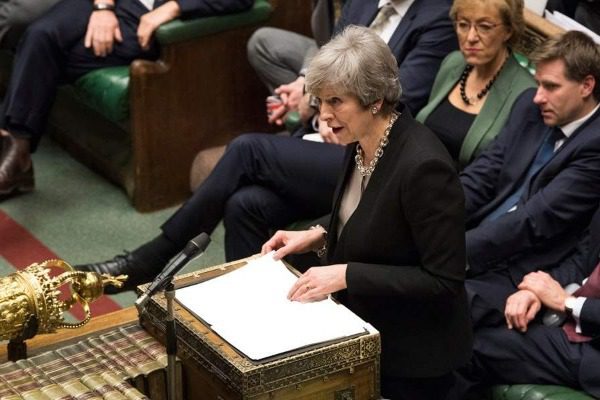May: On the right track to securing a majority
The British Parliament voted in favor of the proposal rejecting an exit from the EU without an agreement, as well as the amendment calling for an alternative to the Irish backstop in today's vote on a series of non-binding amendments that include proposals to change direction on the issue. divorce with the European Union.
A number of amendments have been tabled by MEPs following May's original draft agreement, which was voted against by the British Parliament in early January. Among the amendments are plans to delay leaving the EU in order to avoid an exit without an agreement but also to call for the replacement of the Irish backstop with "alternative arrangements".
- Members of the British Parliament voted against, as expected, with 327 votes against and 296 in favor of the first amendment tabled by the leader of the opposition and leader of the Labor Party, Jeremy Corbyn.
- And the second amendment tabled by Scottish SNP spokesman Ian Blackford, calling for an extension of Article 50, was voted down by 327 against and only 39 in favor.
- The third amendment tabled by former Conservative MP Dominique Greaves, who is in favor of holding a second referendum, also voted against with 321 votes in favor and 301 in favor. Greaves' amendment paves the way for MEPs to consider alternatives to the withdrawal agreement, such as the so-called Norway proposal, proposing that Britain remain in the EU single market and customs union. The rejection of the proposal is seen as a victory for the prime minister, who stressed that the amendment would lead to "usurpation of the role of the executive".
- With 298 in favor and 321 against, the fourth amendment tabled by the Labor MP, Yvette Cooper, did not pass. The amendment gave May until February 26 to secure parliamentary approval for a renewed Brexit agreement. If it passes, MEPs will have the right to ask for an extension of Article 50, the EU process under which the country is due to leave the Union on March 29, while calling for Brexit control to be passed by parliament to parliament.
- The fifth amendment tabled by Labor MP Rachel Reeves was also rejected, with 290 in favor and 322 against. The specific proposal calling for the postponement of Brexit failed to be approved by the House of Commons.
- "Passed" with 318 votes in favor and 310 against the sixth amendment tabled by Labor's Jack Dromay and Conservative Caroline Spelman, which calls for an exit without an agreement to be withdrawn from the negotiating table. The amendment states that exit from the EU is rejected "without an Exit Agreement and a framework for the Future Relationship". It does not specify, however, how the government will be forced to end a withdrawal without agreement.
The prime minister argued that the only way to avoid such a no-deal Brexit is for parliament to vote in favor of an agreement with the EU.
- The seventh amendment tabled by Graham Brady of the Conservatives was voted in favor with 317 in favor and 301 against. The amendment seeks to address the concerns of Eurosceptics Tories, and calls for the Irish backstop to be replaced with "alternative agreements to avoid a tough border".
May: "Opposition of MPs is not enough to prevent a no-deal Brexit"
Addressing lawmakers shortly after the vote, May said a majority tonight said they would support an agreement with backstop changes. It is now clear that there is a way that can ensure a substantial and viable majority for the country to leave the EU by agreement, he added.
The prime minister said, among other things, that the government could now look forward to achieving legally binding changes to the withdrawal agreement, allowing for a tough border between Ireland and Northern Ireland. Negotiations with the EU "will not be an easy task", but MEPs have made clear what is needed to approve the agreement on leaving the EU, May said.
The House of Commons has also confirmed that it does not want to leave the EU without an agreement, but its opposition is not enough to stop it, said the British Prime Minister.
He said the government would now redouble its efforts to secure a deal that could be backed by the House of Commons, and called on opposition leader Jeremy Corbyn to discuss the next steps. Corbin, in turn, accepted May's invitation.
Earlier, the British Prime Minister, in her speech to the parliament, stressed that she seeks to renegotiate the agreement reached with the European Union on Brexit in order to ensure "significant" changes, although this is very likely to meet strong resistance from the Union. .
"The time has come for words to become deeds," he told lawmakers, adding: "If you want to tell Brussels what this House will accept, you have to vote for it. If you want to leave with an agreement, you have to vote for it. "If you want Brexit, you have to vote for Brexit."
